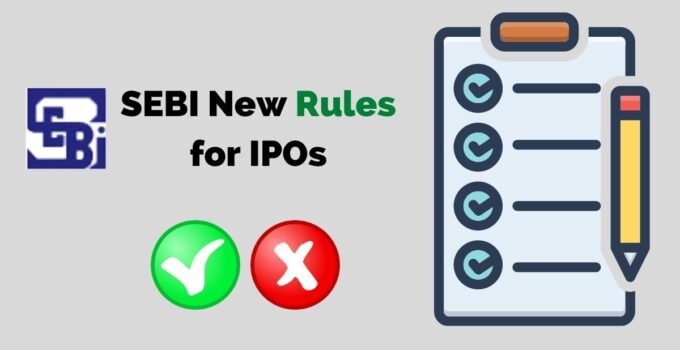The year 2021 was the year of IPOs for the Indian stock market & Last year we saw the most successful IPO in India (Sigachi Industries with listing gain of 249.68%). During this period, 63 companies sold their primary shares and raised Rs. 1.19 lakh crore. Compared to 2020, those ordinary companies sold IPOs at a much higher price. A lot of irregularities were found in some of the issues. Against this background, SEBI has recently made some important provisions regarding IPOs.
List of SEBI New Rules for IPOs
SEBI clarify how companies decide the price of IPOs, when anchor investors can sell their shares, how the company can spend the proceeds from the sale of shares, and how much it can sell to large shareholders on the day of listing. They will be implemented from April 1, 2022
- Large shareholders with more than 20 per cent stake in the IPO company have been barred from selling their entire holdings on the day of listing. However, they can sell 50% of their shares at the time of registration. Currently large shareholders can sell their entire holding through an offer-for-sale route. However, companies of the new age do not have profit, track record or recognizable promoters. In such a case, if the large shareholders sell all the shares, the small investors may incur losses. This rule will help reduce volatility in the overall issue price.
- Companies will now use only 25% of the proceeds from the IPO for anonymous acquisitions. Where they are sure which company they are going to acquire, the limit is kept at 35%. In addition, rating agencies will monitor how the funds are used.
- SEBI has increased the lock-in period for anchor investors (large institutional investors) from 30 days to 90 days. Such investors will be able to sell 50% of their shares in 30 days and the remaining 50 per cent in 90 days. The reason for this rule is that if such an institutional sale occurs suddenly, the share price may become very volatile.
- SEBI has observed that the price range offered by companies in IPOs is extremely narrow. Therefore, changes have also been made in the price band rules of IPOs. The difference between floor price and top price should be at least 5%.
- In HNI category (applications above Rs. 2 lakhs) 1/3 should be reserved for investors who apply between Rs. 2 lakhs to Rs.10 lakh. The remaining 2/3 Should be kept for applications above 10 lakhs.
FAQ on IPOs New Rules
What are the SEBI guidelines for IPO?
In shorts as per new SEBI guidelines there is a strict regulation on price of IPOs, shareholders shares selling, lock-in period, HNI investments.
How will revised IPO rules affect the market?
The new rules will help protect small and retail investors and bring more transparency and clarity to the upcoming IPO.
What are the eligibility requirements to trade IPOs?
Having a Demat and Trading account is the most important eligibility for trading an IPO.
How many minimum shares can I buy in IPO?
It depends on the IPO lot size. Each investor can apply for at least 1 lot. The company’s cut-off price determines the number of shares in a lot of IPOs.
Conclusion
In the current scenario, SEBI wants to create a safe environment for investment so that the general public can invest more. SEBI is also concerned that large investors or company owners will not take advantage of the flaws in the rules. From next financial year every company need to follow SEBI New Rules for IPOs.
Any stock market progresses if it grows in an open manner. But while this is happening, there is also an influx of bad habits. So with all this in mind, the steps taken by SEBI are certainly welcome.
Take a Look




